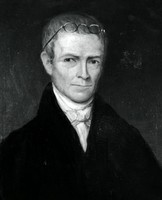Archibald Murphey

Archibald Debow Murphey, a high honor graduate of 1799, was professor of Ancient Languages for the year 1800. He was a native of Caswell, born in 1777, son of a Revolutionary officer. After leaving the University he settled as a lawyer in Hillsborough. From 1812 to 1818 he was a state senator, and as such was the most active of all our public men in promoting a public school system and internal improvements. His report to the Legislature of 1819, on the public school systems of different countries deemed most successful, is a marvel of intelligent labor. From 1818 to 1820 he was a judge of the Superior Court, and in 1820 he was, under an act since repealed, a judge of the State Supreme Court for one term as a substitute for Judge Henderson, who had been counsel in important cases then before the court. He was reporter of the decisions of the old Supreme Court 1804 to 1813, and of the new court in 1818 and 1819. He was a trustee of the University for thirty years. Shortly before his death he collected valuable material for a history of the state, and to aid him in writing and printing it the General Assembly gave him authority to realize $15,000 by a lottery. This material was used by Joseph Seawell Jones (Shocco) in writing his “Defence of North Carolina” and by President Swain in preparing his “War of the Regulation” and other monographs. Judge Murphey’s address before the two societies of the University in 1827 is full of historical information of value.
A letter from him to President Caldwell, dated December 29, 1808, indicates that, wearied with his professional pursuits, he sometimes longed for the academic shades he had resigned. He regrets that his “prime of life” is spent in vulgar pursuits. The improvement of the mind is suspended, the paths of wisdom are unexplored. He fears he will lose a relish for the pleasures of intellect; what is worse that he will lose that fine tone which the pursuit of knowledge gives to the feelings, and without which the world can afford but little happiness. While not finding fault with Providence, he had often wished that fortune had thrown into his way riches, that he might withdraw from the distractions of petty business and attempt once more to cultivate true knowledge. Fortune has smiled on him since he left the University and he entreats her to continue her friendship until she enables him to live in independence and affluence.” Alas! The good man, notwithstanding a most honorable career in public and private life, lost all his property by unfortunate investments and suretyships, and was even subjected for a short while to the indignity of confinement in prison bounds for debt.
Judge Murphey was always a true and active friend of the University. In the scholarly report on public education above-mentioned he is emphatic in testifying to its good work and in advocating state aid in its behalf. I give some of his language: “This institution has been eminently useful to the State. It has contributed, perhaps more than any other cause, to diffuse a taste for reading among the people, and excite a spirit of liberal improvement. It has contributed to change our manners and elevate our character.” He then urges the construction of three additional buildings, i. e., two dormitories and one for library and apparatus; that a library and suitable apparatus be purchased, that two professorships be endowed and that six additional teachers be provided. “When former prejudices have died away, when liberal ideas begin to prevail, when the pride of the state is awakened and an honorable ambition is cherished for her glory, an appeal is made to the patriotism and the generous feelings of the Legislature in favor of an institution which in all civilized nations has been regarded as the nursery of moral greatness and the palladium of civil liberty. That people who cultivate the sciences and the arts with most success acquire a most enviable superiority over others. Learned men by their discoveries and their works give a lasting splendor to national character; and such is the enthusiasm of man that there is not an individual, however humble in life his lot may be, who does not feel himself blessed to belong to a country honored with great men and magnificent institutions. It is due to North Carolina, it is due to the great man (General Davie) who first proposed the foundation of the University, to foster it with parental fondness and to give it an importance commensurate with the high destinies of the State.”

Source: Kemp Plummer Battle, History of the University of North Carolina, Vol. 1 (Raleigh 1907), 162-163.